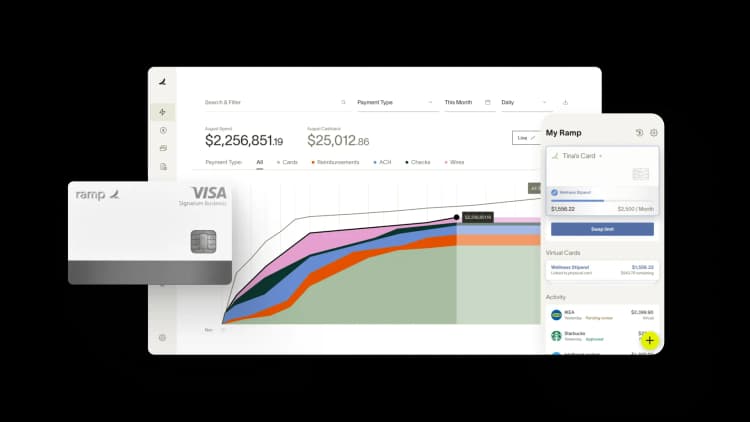How legacy corporate cards increase vulnerability to fraud and fines


Even as organizations are embracing digital transformation, many finance departments remain stuck manually managing expenses with paper receipts, monthly statements, and after-the-fact policy enforcement. The result is a costly and risky operational gap that leaves companies vulnerable to fraud, inefficiencies, and compliance headaches.
Ramp recently published Fraud, fines and forensic audits: The true cost of legacy corporate cards and expense management, a deep-dive that examines how to protect your business from key vulnerabilities. The paper lays out a network of risks and remediations for finance leaders using legacy card and expense systems. It draws on expert insights and empirical research to illuminate the path from outdated, complex finance workflows to intuitive systems that help reduce risk, increase spend visibility, and fuel the engine of modern finance teams.
Ramp identified three major risks to using outdated accounting technology:
- Delayed financial decision-making
- Increased vulnerability to fraud
- Compliance and audit complexity
The cost of vulnerabilities
Our report reveals stunning realities about the real financial impact of these risks.
A few key findings to call out:
- Companies lose a median of $50,000 yearly to expense fraud—up $10,000 from two years ago—according to the Association of Certified Fraud Examiners' (ACFE).
- Expense reimbursement fraud occurred in 13% of asset misappropriation cases and lasted an average of 18 months before detection, making it one of the most enduring types of fraud, per ACFE.
- U.S. credit card debt grew to more than $1.21 trillion in Q4 2024, up more than $45 billion from the previous quarter, the Federal Reserve Bank of New York reported. This rising debt burden increases the risk of employees turning to expense fraud for financial relief when burdened with out-of-pocket business expenses.
- Procurement fraud is among the top three most disruptive economic crimes experienced by companies globally, just behind cybercrime and corruption, according to PwC's Global Economic Crime Survey. More than half the companies surveyed cited procurement fraud as a major concern in their countries.
Reducing the impact and cost of fraud
Ramp data shows that modernizing card and expense systems can help businesses save serious time and money.
- Large companies using Ramp saved an average of more than 36 hours per month across their finance team. Between cash back and time saved, those companies averaged $22,033 in monthly savings.
- Ramp’s data shows modern expense systems have saved businesses more than $2 billion, in many cases by cutting redundant spend.
For example: Barry's, a leading boutique fitness company operating 84 locations across 14 countries, faced significant challenges with its legacy corporate card and expense management systems that impeded the finance team’s ability to focus on strategic initiatives. By using Ramp, the business eliminated 400 hours per month in administrative work.
For more on how modern finance tools can help businesses save money and reduce risk, get your copy of the full Fraud, fines and forensic audits report.

“In the public sector, every hour and every dollar belongs to the taxpayer. We can't afford to waste either. Ramp ensures we don't.”
Carly Ching
Finance Specialist, City of Ketchum

“Ramp gives us one structured intake, one set of guardrails, and clean data end‑to‑end— that’s how we save 20 hours/month and buy back days at close.”
David Eckstein
CFO, Vanta

“Ramp is the only vendor that can service all of our employees across the globe in one unified system. They handle multiple currencies seamlessly, integrate with all of our accounting systems, and thanks to their customizable card and policy controls, we're compliant worldwide. ”
Brandon Zell
Chief Accounting Officer, Notion

“When our teams need something, they usually need it right away. The more time we can save doing all those tedious tasks, the more time we can dedicate to supporting our student-athletes.”
Sarah Harris
Secretary, The University of Tennessee Athletics Foundation, Inc.

“Ramp had everything we were looking for, and even things we weren't looking for. The policy aspects, that's something I never even dreamed of that a purchasing card program could handle.”
Doug Volesky
Director of Finance, City of Mount Vernon

“Switching from Brex to Ramp wasn't just a platform swap—it was a strategic upgrade that aligned with our mission to be agile, efficient, and financially savvy.”
Lily Liu
CEO, Piñata

“With Ramp, everything lives in one place. You can click into a vendor and see every transaction, invoice, and contract. That didn't exist in Zip. It's made approvals much faster because decision-makers aren't chasing down information—they have it all at their fingertips.”
Ryan Williams
Manager, Contract and Vendor Management, Advisor360°

“The ability to create flexible parameters, such as allowing bookings up to 25% above market rate, has been really good for us. Plus, having all the information within the same platform is really valuable.”
Caroline Hill
Assistant Controller, Sana Benefits



